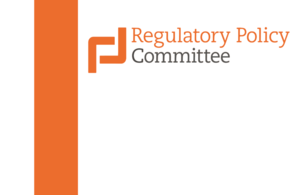RPC Corporate Report - 16-17
RPC’s annual report highlights need for effective scrutiny of wider impacts on society.

Having scrutinised over 300 submissions last year, from government departments and regulators the RPC still finds much of their analyses wanting when considering the impact of their actions on wider society. “Following the tragic events at Grenfell Tower, it is important more than ever, that the risks to and impacts on society should be rigorously scrutinised on an equal footing with business costs and benefits, as we have previously recommended. The RPC believes it should be able to “Red rate” inadequate appraisals of both sets of impacts,” says Michael Gibbons CBE, Chairman of the Regulatory Policy Committee.
Equally concerned about the direction of travel is Frances O’Grady, General Secretary of the TUC said: “we welcome this report, once again the RPC is showing that the issue is not about what we regulate or deregulate, it’s about how we can make the system work for all of society. That means that we need to gain a consensus for strong, effective regulation that is enforced appropriately and having a body such as the RPC to oversee the process is invaluable”.
Michael Gibbons CBE says “the independent Regulatory Policy Committee stands ready to scrutinise the evidence base for regulatory changes associated with Brexit. The RPC’s recent Opinion on the European Union (Withdrawal) Bill, notes that there are likely to be various forms of regulatory change as a result of EU exit, for example as to freedom of movement of goods, services, labour and capital, and such changes are likely to have significant impacts on business and wider society. The RPC emphasises that all such regulatory changes should be subject to impact assessment and independent scrutiny.”
Also urging caution in this period of significant transition and change is Dr Adam Marshall, Director General of the British Chambers of Commerce (BCC), who says “it is vital that any regulatory changes which impact the UK’s business communities are justified and rational. Government departments must be extremely careful in making and implementing regulatory changes which may have unintended consequences. In this time of uncertainty, businesses need as much regulatory continuity as possible to sustain confidence and investment.”
In addition as the system shifts to domestic regulatory oversight, Terry Scouler Chief Executive of EEF, the manufacturers’ organisation, said: “the critical work of the RPC is particularly important as we prepare to leave the EU and as the effectiveness of regulatory regimes come under greater scrutiny.”
The RPC’s annual report (highlights listed below) states there is concern at the fitness for purpose of departmental impact assessments. The RPC is at the same time mindful of the need to review the framework itself and aims to work closely with the government to ensure it is proportionate yet robust moving forward. Martin McTague, Policy Director of the Federation of Small Businesses (FSB), said: “The FSB continues to be the leading voice in championing the great work the RPC does. In particular, its efforts to hold those Government Departments, which produce new regulation, to account by improving the quality of Regulatory Impact Assessments. We hope that Government continues to value the role of the RPC by ensuring that it is sufficiently resourced and at the heart of improving the regulation agenda.”
NOTES TO EDITOR
- The Regulatory Policy Committee (RPC) is the independent advisory body set up to provide external, transparent, real time scrutiny on the quality of evidence and analysis supporting regulatory changes affecting business and civil society.
-
We give Ministers opinions in advance, to help ensure decisions on legislative proposals are based on a robust evidence base, which provides businesses and the public with confidence that the government’s claims on regulatory reform are credible.
- KEY REPORT HIGHLIGHTS
• We scrutinised 324 proposals; 231 from government departments and 93 from regulators. • It is of concern that only 69% of government impact assessments were fit for purpose at first submission. • The numbers of Post Implementation Reviews (PIRs) being conducted are still too low. We are still waiting for and remain concerned that we have yet to see PIRs for some of the most significant measures from the pre 2015 parliament, e.g. relating to pensions. • RPC took over the Chairmanship of RegWatchEurope this year– an EU wide group of like-minded national independent scrutiny bodies.
For further information please contact [email protected]